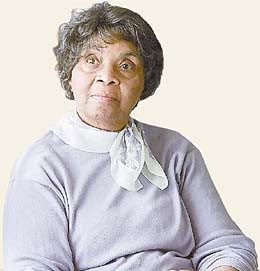 So I've been writing a lot lately about women in pop culture. Which is a good thing, because pop culture has a huge influence on society. But last night, when I was trying to decide who I'd write about next, I figured it was probably time for me to tackle someone who has had an incredibly large effect on society, culture, politics, etc. So I decided I'd write about the first African American woman who refused to give up her bus seat to a white person. Rosa Parks.
So I've been writing a lot lately about women in pop culture. Which is a good thing, because pop culture has a huge influence on society. But last night, when I was trying to decide who I'd write about next, I figured it was probably time for me to tackle someone who has had an incredibly large effect on society, culture, politics, etc. So I decided I'd write about the first African American woman who refused to give up her bus seat to a white person. Rosa Parks.Except, to my surprise, Rosa Parks was not the first African American woman to refuse to move.
(How did I not know this?)
Turns out, a woman living in Virginia named Irene Morgan (later Irene Morgan Kirkaldy) refused to give up her seat, an astounding eleven years before Rosa Parks made the same stance. (Don't get me wrong here: Rosa Parks is an immensely important woman in the fight for civil rights, and I am in no way trying to downplay her role. I was just surprised that I had never heard of Irene Morgan.) One morning in July of 1944, 27 year old Morgan boarded an interstate bus bound for Baltimore. Though she was seated in the area designated for "coloured people," at the next stop the bus driver asked her and the person she was sitting with to move farther back, to make room white people boarding the bus. And Irene Morgan refused.
-Here's where it gets amazing.-
The bus got the sheriff to arrest Miss Morgan. And you know what she did? She "tore up the arrest warrant, kicked the sheriff and fought with the deputy who tried to drag her off the bus." (Wikipedia) In the end, they succeeded, and she was charged with resisting arrest, and (get this) violating Virginia's segregation laws. (How, exactly, did she violate the laws when she was sitting well within the area designated for African Americans?) I'm assuming this is what Irene Morgan was wondering as well, because though she pleaded guilty to resisting arrest, and paid a fine of $100, she pleaded not guilty to violating segregation laws. (Good for her!) Yet she was FOUND GUILTY! of the second charge anyways!
So what did she do, kids?
She brought her case to the Supreme Court.
And she won.
In 1946, the Supreme Court decided that they agreed with Irene Morgan, and they struck down the segregation laws of interstate transportation.
One year after her case was won, civil rights activists took the first "Freedom Ride," in defiance of the Southern States' refusal to bow to the new anti-segregation laws. Twelve people were arrested. "Along the way, however, 12 of them were arrested on six occasions for sitting together, black and white, in both the front and back of the bus and refusing drivers' orders to segregate." (Washington Post)
From the same Washington Post article:
"She has continued to inspire her family with acts grand and neighborly. In Baltimore, she passed out petitions demanding an end to school segregation without telling anyone who she is. She wrote to the pope seeking his intervention in the case of a Haitian whose children had been barred from parochial school. She rescued a neighborhood boy from a burning building. Every Thanksgiving, she invites two homeless residents over for dinner and laundry."
So not only did the woman contribute to the end of segregation, but she also saved someone from a burning building?! Now that is what I call a hero.
In 2001, Irene Morgan Kirkaldy received the Presidential Citizens Medal, from Bill Clinton. She passed away on August 10th, 2007, at the age of ninety.
So, here's the question: How many of you guys have heard of Irene Morgan? And, honestly, why not?
(p.s: Thanks to Wikipedia and the Washington Post for all their information.)

No comments:
Post a Comment